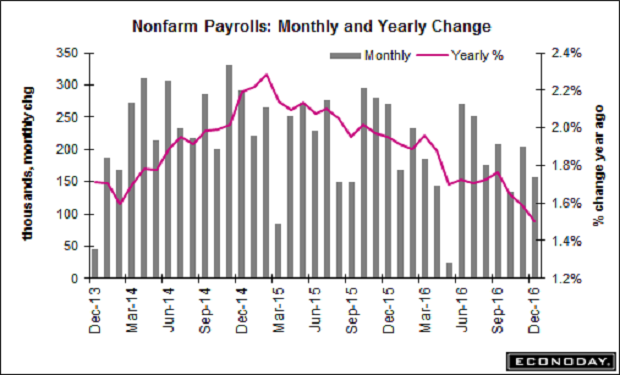Stocks keep climbing, even as job growth slows
As I write this, the Dow Jones industrials index is within a hair of the 20,000 benchmark -- a level it has been flirting with for weeks.
The catalyst, confusingly, was a softer-than-expected jobs report for December. Payrolls expanded by 156,000 vs. the 175,000 forecast. The unemployment rate rose slightly to 4.7 percent.
So why would stocks get excited about a slowdown in jobs? Because if it’s representative of a trend change in employment growth, it’s more likely to dampen the pace of Federal Reserve interest rate hikes in 2017.
Backing up, stocks have a tendency to rise on payroll Fridays no matter the result. Weak reports are seen as a positive because they mean it’s likely to prolong the era of ultralow interest rates. Strong reports boosts stocks on expectations of increased consumer spending, bolstered confidence and, as a result, higher corporate earnings growth.
So no surprise then, stocks are rallying on a soft report given one of the major worries for investors in the new year is the risk of a faster-than-expected pace of tightening by the Fed. Officials have penciled in three quarter-point hikes in 2017 on the risk that aggressive fiscal policy stimulus from the incoming Trump Administration will boost GDP growth and inflation.
Should job creation continue to decelerate, the Fed will be hard pressed to stick to this three-hike forecast. Hiring has clearly declined from its monthly pace seen over the summer (chart above). It’s hard to say what’s driving the slowdown, given the surge in post-election confidence, the end of the two-year corporate earnings recession and a rebound in the energy sector.
Some evidence points to a slowdown in corporate spending -- perhaps revealing that despite stated confidence on surveys, business managers are actually tightening up their equipment outlays and hiring plans.
Why aren’t stocks looking through the “jobs weak, Fed on hold” dynamic to be concerned about these deeper economic issues? Because, as has been proved time and time again during this bull market, for Wall Street the promise of cheap money trumps hard economic fundamentals.
Another possibility is that the stock bulls are focused not on the headline payroll numbers -- which admittedly are volatile -- but on growing evidence of the wage gains consumers have been waiting so long for. Average hourly earnings posted a 2.9 percent jump from last year, extending a rising trend in income. In mid-2016, earnings were rising at a 2.6 percent rate. For 2015, they rose 2.5 percent.





